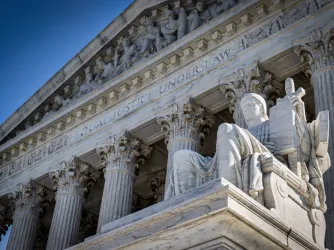Table of Contents
Good News from Capitol Hill: With Presidential Signature, Whistleblower Protection Enhancement Act Now Law
Last week generated an important victory for free speech in Washington, D.C. After years of effort by First Amendment and government accountability advocates, the Whistleblower Protection Enhancement Act (WPEA) was unanimously passed by Congress and signed into law by the President.
This is good news because the newly passed WPEA corrects one of the free speech problems presented by the Supreme Court's decision in Garcetti v. Ceballos, 547 U.S. 410 (2006). The Garcetti case dealt with a prosecutor who disclosed that one of his colleagues was hiding exculpatory evidence. The prosecutor sued after he was passed over for promotions, allegedly as a result of his whistleblowing. The case eventually reached the Supreme Court, which held "that when public employees make statements pursuant to their official duties, the employees are not speaking as citizens for First Amendment purposes, and the Constitution does not insulate their communications from employer discipline." 547 U.S. at 421.
There are two critical problems with the Garcetti decision. First, it essentially strips public employees of whistleblowing protection under the First Amendment, thus serving to dissuade honest public employees from disclosing important information about government abuses of power or public funds, whether at the federal, state, or local level. Second, it grants government entities a broad ability to censor and punish public employees, even for simply disagreeing with their bosses.
This second point is particularly important to FIRE because permitting state universities to suppress dissenting views negatively impacts academic freedom. Imagine, for example, a public policy professor who disagrees with his university's decision to raise tuition, or who disagrees with the administration on a contentious political or academic question. If Garcetti's holding were applied in the academic setting, the university could discipline the professor for making these views known as part of a discussion in his classroom or published in scholarship, because such statements would have been made pursuant to the professor's official duties.
However, in a footnote, the Garcetti Court recognized that "there is some argument that expression related to academic scholarship or classroom instruction implicates additional constitutional interests that are not fully accounted for by this Court's customary employee-speech jurisprudence." With this carve-out, the Court decided not to address how (or if) its holding would apply in the academic setting, leaving the question unsettled. The mere possibility that Garcetti may be applied in the academic setting, however, substantially chills speech, and, as we've discussed often here on The Torch, some courts have applied Garcetti to university professors' speech.
So back to the good news. Now that the WPEA is law, most federal employees are protected when they disclose information that they reasonably believe evidences: "i) any violation of any law, rule, or regulation; or ii) gross mismanagement, a gross waste of funds, an abuse of authority, or a substantial and specific danger to public safety." This welcome change in the law addresses the whistleblowing problem presented by Garcetti—although only with respect to most federal employees, thus leaving most university professors, who are not typically federal employees, out.
But the WPEA leaves the second problem—the government's broad ability to censor and punish public employee speech—unresolved altogether. While most federal whistleblowers are now protected, public employees simply talking about public matters that are in any way related to their duties at work may still be punished by their bosses even under this new legislation. Again, this is of particular concern in the academic setting, as FIRE and groups like the American Association of University Professors have noted repeatedly.
Congress and the President have taken an important step to advance the cause of free speech, but more work needs to be done to once and for all redress the problem created by Garcetti for faculty members at public institutions. Hopefully, when Congress reauthorizes the Higher Education Act, it will decisively state that all public employees in the academic setting must be free to speak their minds about all matters, including—and perhaps especially—those issues related to their official duties. We'll certainly keep you up to date.
Recent Articles
Get the latest free speech news and analysis from FIRE.

The federal charges against Don Lemon raise serious concerns for press freedom

The American people fact-checked their government

California prohibits its teachers from talking about a student's gender identity to their parents. That raises First Amendment concerns.
